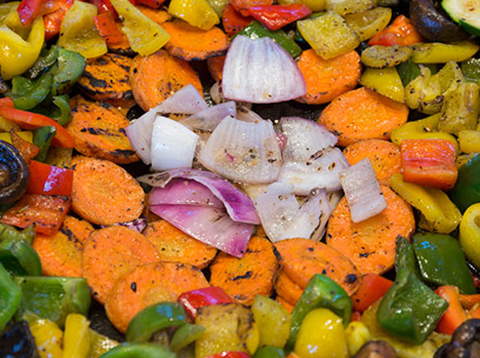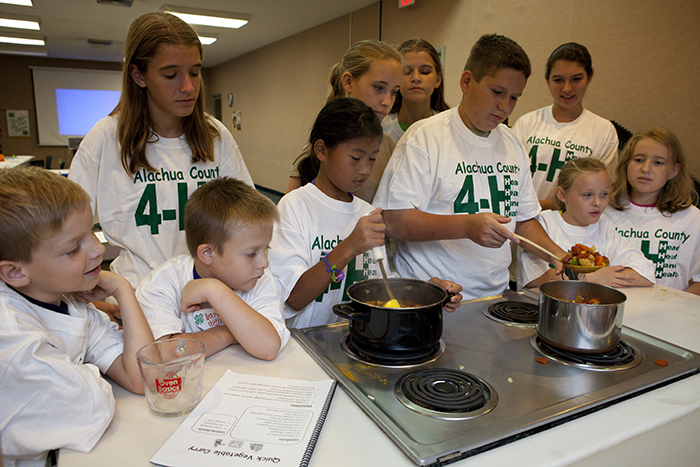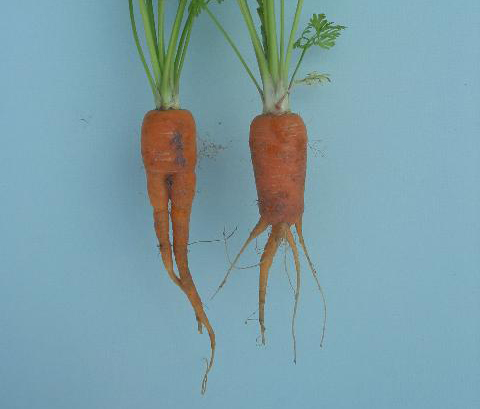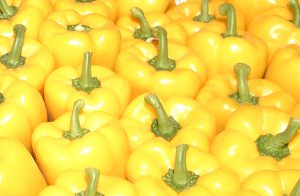
It’s that time of year again when the variety of produce available at the farmers’ markets dwindles and you’re largely limited to hardy, heat- and drought-tolerant Florida vegetables like eggplant, okra, Seminole pumpkin and Malabar spinach. For weeks now nobody has had carrots at the Saturday market except for one stall, and theirs are all… nematode-ey. I buy them, anyway, because I’m not going to Publix for some trucked-in-from-Cali carrots when there are perfectly good Florida-grown carrots right there in front of me. They may have a bit of cosmetic damage but they’re still delicious and full of healthful fiber and beta carotene and whatever all other micronutrients carrots have that are good for you.
Florida vegetable curry… in Ireland!
I happen to have a can of Irish “Chip Shop Curry” mix that I got at the European market when I visited my aunt and uncle in North Carolina earlier this summer. All you do, you mix four heaping tablespoons of this stuff with 400 ml of water and start it simmering. Then you cut up whatever you gleaned from the farmers’ market in order of how much time it needs to cook and throw it in the pot with the curry stuff. (I’m going to make my own premix when I run out of the storebought stuff by combining a bunch of flour with a bunch of curry powder and adding a smaller bunch of supersalt [which is regular table salt + MSG, countless brands available at an Asian market near you]. Probably not a great idea to leave that stuff sitting around too long, because flour does spoil, and of course my homemade mix won’t have preservatives, but I tend to resort to curry a lot when faced with piles of vegetables, so I’ll probably use it up quickly.) Best of all, the can from the European market promises that I will think I’m in a cottage in Ireland eating takeaway from a chip shop! It’s hard to imagine a more refreshing dinner plan for a summer night.

Nematodes love Florida vegetables, too
What do I mean by “nematode-ey carrots?” I mean carrots that look like the two in the picture below. Those two carrots have the telltale forking that reveals they’ve been attacked by nematodes, which are tiny little creatures that live in the soil and that have a love for root crops almost as fierce as my own. Carrots with nematode damage are fine to eat. The problem is, they can be hard for growers to market because they don’t look like the perfect specimens you see in supermarkets. UF/IFAS scientists are working to help out Florida farmers by finding ways to protect carrots and other crops from nematode damage. You can keep current on the latest discoveries and innovations in the ongoing struggle against nematodes on Ask IFAS.

I found out that if you get nematode-ey carrots, you have to peel them more assiduously than you otherwise would to get rid of the damaged bits, but I still ended up with a sizeable, tasty pile. I tossed my trimmed and diced carrots into the simmering curry mix, and then I cut up and added a farmers’ market onion I’d brought home a month or two previous. (You have to remember to buy more onions than you think you’ll ever need while you see them in the market, because even if every farmer is selling them in great abundance and the place is overflowing with onions week after week, the time will come when the season will end and there will be No More Onions At The Farmers’ Market. No matter how comically many you get, you will run out eventually and have to resort to tragic corporate onions with no personality, but the idea is to stave off that eventuality as long as possible. [This advice of course comes too late, but my theory is that if I write it here, maybe I will remember next year.])

Finishing touches
Lots of people still had peppers last time I was at the market. I added a big yellow one to the curry. If I’d remembered, I’d have added some mushrooms, too, from my giant “chef’s mix” sack, also from the farmers’ market, but I forgot. That’s okay: I’m storing them in a paper bag in the ‘fridge and if they dry out before I get to them, they’ll re-hydrate just fine. I’ll put them in some soup or something. Mushrooms are another thing that you can find at the farmers’ markets through the summer because they’re grown inside, out of the swelter.

The verdict:
Even with just the three vegetables, the Chip Shop Curried carrots turned out pretty well. They worked nicely with a side of curried “Bachelor Beans” out of another can from Ireland, also a European market find. In this manner we were able to pretend relatively successfully that we’d visited an Irish chip shop and ordered takeaway, just as the Chip Shop Curry can assured us we would. It probably helped that neither of us has ever been to a chip shop or to Ireland.
Want to grow your own carrots and keep them safe from nematodes? Find strategies in the “Nematode Management in the Home Lawn, Landscape, and Garden” subsection on the Ask IFAS nematode topic page. Test your soil and don’t plant if nematodes are present, or plant earlier for an earlier harvest: nematodes don’t like the cold. You can also try soil solarization.
Want to grow your own mushrooms? Ask IFAS can help with that, too! https://edis.ifas.ufl.edu/publication/SS662. Consult Ask IFAS for all Florida vegetable questions.
 1
1
